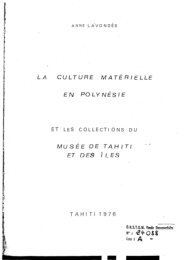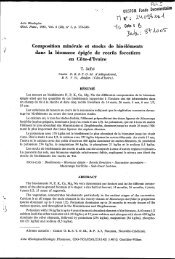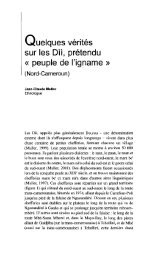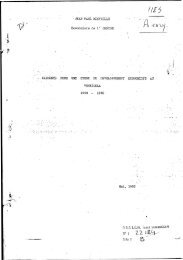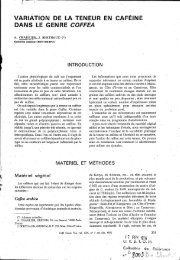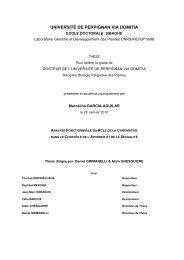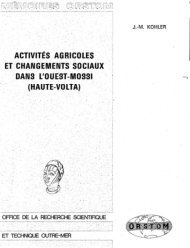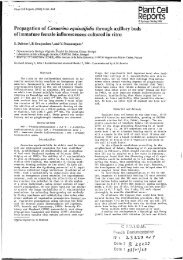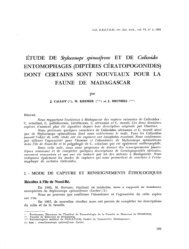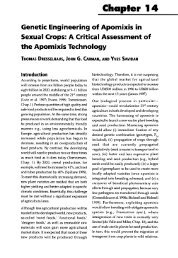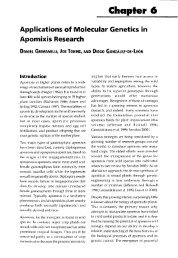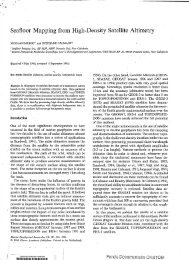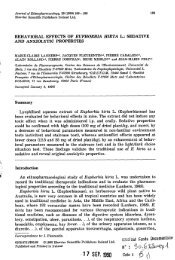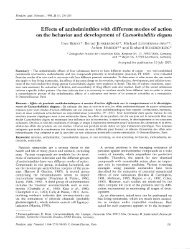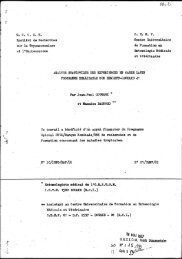A study case on coffee (Coffea arabica): Limu Coffe - IRD
A study case on coffee (Coffea arabica): Limu Coffe - IRD
A study case on coffee (Coffea arabica): Limu Coffe - IRD
You also want an ePaper? Increase the reach of your titles
YUMPU automatically turns print PDFs into web optimized ePapers that Google loves.
1.6) <strong>Limu</strong> <strong>coffee</strong> cup profile<br />
Let see some points of view met <strong>on</strong> roasters forums:<br />
- About an organic <strong>coffee</strong> produced at 1850 masl in Goma woreda, and called<br />
Ethiopia <strong>Limu</strong>-Goma organic <strong>coffee</strong>: “The altitude allows for a slowing of the growth process<br />
and a much denser bean. This <strong>coffee</strong> is an explosi<strong>on</strong> of citrus. In the cup, we get bright citrus,<br />
lem<strong>on</strong> grass and even sweet garden peas in the finish.” (Kenneth Davids <strong>Coffe</strong>e review)<br />
Flavour profile<br />
Aroma H<strong>on</strong>ey, cherryish <strong>coffee</strong> fruit, flowering<br />
grass<br />
Brightness Vibrant acidity<br />
Cocoa and h<strong>on</strong>ey with a l<strong>on</strong>g, res<strong>on</strong>antly<br />
Flavour<br />
flavourful finish<br />
Body<br />
Lightly syrupy<br />
- “So I’m surfing and looking at the profile charts and I stumble up<strong>on</strong> this newer<br />
<strong>coffee</strong> from Ethiopia. I looked at the chart and saw that it is really what I could want in a<br />
<strong>coffee</strong>…I think the Sidamo is dark although I like it a lot…I like Yirgacheffe but I thought<br />
<strong>Limu</strong> was a bit weak, lacking that distincti<strong>on</strong> the Ethiopian <strong>coffee</strong>s have…or of course I could<br />
have roasted it poorly…I am relieved to see that I am not the <strong>on</strong>e struggling with the <strong>Limu</strong>. It<br />
is easy to think that being a new roaster poor results come from the operati<strong>on</strong>al errors and<br />
not from the bean used…”<br />
- About Ethiopian <strong>Limu</strong> Dry-Processed: “We kept this roast quite light, more than we<br />
would normally do for a dry processed Ethiopian <strong>coffee</strong>. This <strong>Limu</strong> has lighter body, herbal<br />
bright notes, lem<strong>on</strong> balm. It is not a super intense Ethiopia. But with a lighter roast treatment,<br />
some subtle complexities come out, unhindered by an overbearing bitter sweetness from the<br />
roast. A <strong>on</strong>e tasting I had a lot of h<strong>on</strong>ey sweetness, but overall it’s not a very sweet <strong>coffee</strong>. It<br />
is quite dry in fact. I cupped it while travelling a few days later and other cuppers were<br />
commenting <strong>on</strong> they dry fruit finish (not dried fruit). It is unusual and I think it has to do with<br />
regi<strong>on</strong>al <strong>Limu</strong> origin character.” (Thomps<strong>on</strong> Owen, 2008)<br />
18



